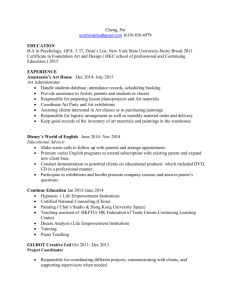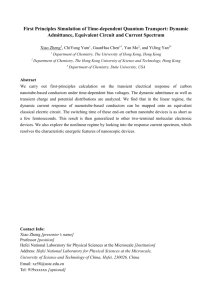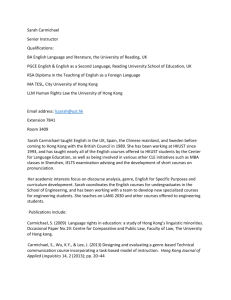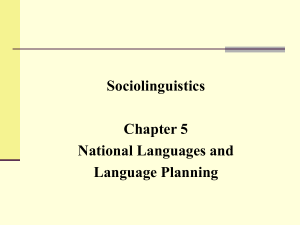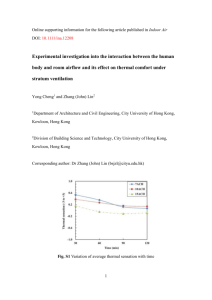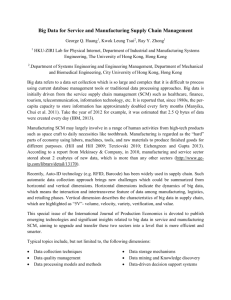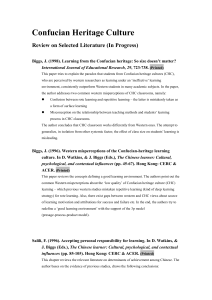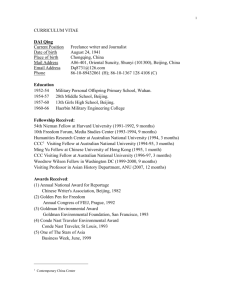My Love Story with the English Language and British Cultures By
advertisement
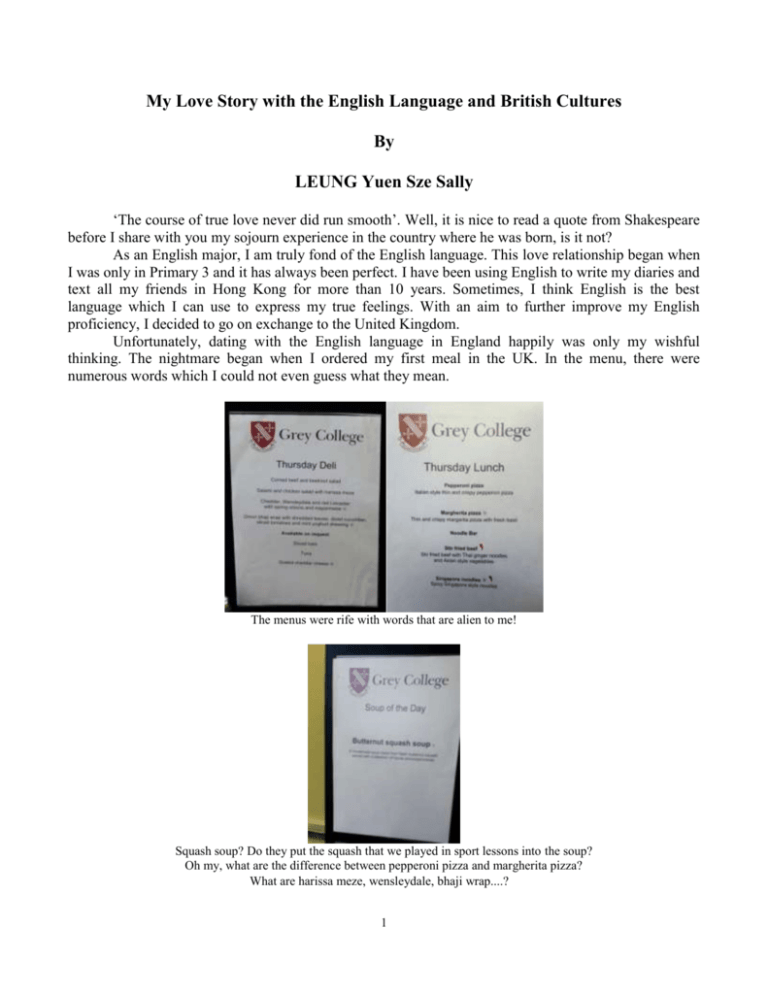
My Love Story with the English Language and British Cultures By LEUNG Yuen Sze Sally ‘The course of true love never did run smooth’. Well, it is nice to read a quote from Shakespeare before I share with you my sojourn experience in the country where he was born, is it not? As an English major, I am truly fond of the English language. This love relationship began when I was only in Primary 3 and it has always been perfect. I have been using English to write my diaries and text all my friends in Hong Kong for more than 10 years. Sometimes, I think English is the best language which I can use to express my true feelings. With an aim to further improve my English proficiency, I decided to go on exchange to the United Kingdom. Unfortunately, dating with the English language in England happily was only my wishful thinking. The nightmare began when I ordered my first meal in the UK. In the menu, there were numerous words which I could not even guess what they mean. The menus were rife with words that are alien to me! Squash soup? Do they put the squash that we played in sport lessons into the soup? Oh my, what are the difference between pepperoni pizza and margherita pizza? What are harissa meze, wensleydale, bhaji wrap....? 1 When I asked the staff about the food, they replied in a strong Geordie accent and I could hardly understand what they said. Therefore, most of the time, I did not know what I was eating! Apart from eating ‘unknown food’ in the canteen, when I went to the pub with some UK students during Fresher’s week, they all spoke colloquial English very fast. The style of their language is totally different from the English that professors use during lectures and is definitely different from the styles of English which I was familiar with. When I first arrived, it often took me a few seconds to figure out what they were talking about. Unfortunately, when I finally understood the topics and was about to generate a reply, they had already started discussing other subjects. Hence, for the first time in many years, I became tongue-tied in an English conversation. I kept silent most of the time that night in the bar, faking a smile but not truly smiling deep down in my heart. Not being able to join in the discussions of local students, I strongly felt that I was an outsider in the UK. Dejected and frightened by that terrible experience in the bar, I became much more introverted. Since I did not want to look like a mute and stupid girl who cannot join any conversation, I seldom chatted with the local students again that week. I found that no matter how much I love or loved the English language, it is still my second language. It was extremely tiring to speak and hear English every second everywhere. The English language around me was no longer the one that I was familiar with. It seemed that my lover had changed to another person. At that moment, I started to know more about the negative sides of him. Love is blind! I was fooled by him for the last 15 years! When a couple argues, they can choose to stop seeing each other, but in a relationship with the English language in the UK, I could not. This annoying language kept entering my ear when I spoke to anyone anywhere. I eagerly wanted my sojourn to stop temporarily so that I could forget English for a while. I no longer wanted to use English any more. This is indeed a shameful thing because I am still an English major. I felt so bad about it. Apart from my broken relationship with the English language, I also had lots of conflicts with British cultures, which became more and more outlandish to me. For instance, I thought I could often savour delicious British afternoon tea and other finger-licking British food, but the meals from my hostel canteen were awful. Most of the time I only had tasteless potatoes and cold sandwiches to choose from. We Chinese people think that it is unhealthy to eat cold food, particularly in the morning, but I was given cold milk for breakfast every day. Moreover, you could imagine my disappointment and frustration when I paid £30 (approximately HKD$360) for the high table dinner but merely got for the main course some chicken breast—the least desirable meat in Chinese cuisine! So this was the darkest period in my sojourn. Depressed, I chose to spend most of my time with other Hong Kong students and did not establish any close friendship with the local students. In fact, I bought six mooncakes from Hong Kong and was planning to share them some locals and international students. Two weeks had passed and the mooncakes were about to expire, but I still could not find a UK friend to share them with. All the local students who I became acquainted with were hi-bye friends who would merely exchange greetings with me when we meet in the pantry. In the end, I ate up all six mooncakes myself. These six Chinese delicacies which were supposed to be used for cultural exchange eventually served to be a soothing reminder of home, which further trapped me in my comfort zone. During the dark times, I began to question why I chose to come to this foreign country to endure loneliness and horrible food, and end up breaking up with the English language. This inspired me to review my goals for this sojourn. I then realised that staying with Hong Kong students all the time and staying in my comfort zone during my sojourn is not what I came here for! I must try harder to establish intercultural friendships no matter how challenging it is. I must not end my love relationship with 2 English! To face the problem directly, I then devised a more specific plan—the ‘take-one-step-further approach’. This means that whenever I meet the local students whom I am acquainted with, I should not merely greet them, but should take a step further to chat with them so that we could understand one another better and thus develop stronger friendship. I also learned to act like a British. For instance, after noticing that the Brits usually hold the door for others even though the next person is many steps away, I did likewise to show my friendliness and to immerse myself into the local culture. With a sense of goodwill, it does help me start a conversation with the local students. Furthermore, I signed up for numerous activities and joined clubs and associations which I like and feel most comfortable with. It is much easier to chat with local students in the society meetings than in the noisy bars! Soon I made quite a lot of like-minded British and international friends! Things improved gradually. Having developed stronger bonds with the local students, I have also gradually started to rebuild my love relationship with the English language. I no longer felt tired to hear and use English every day. I have become even more bilingual than before as I am now totally comfortable with speaking English all the time! In my room, I talk to myself in English, I think in English. I even use English in my dreams when sleeping at night! The views of the boundless fields in North-east England from the flight which I took to Durham. When rebuilding my relationship with the English language, my identity is enriching, but not changing. My Chinese ties are still as strong as before, but I have started to embrace elements from British cultures. I reckon my identity is an endless field. Like the fields in North-East England which seem to have no borders, there is always unlimited room for me to plant new exotic crops. When I plant some British crops, I never have to cut away my original Chinese crops. When looking at an issue, I can always choose to see it from any part of my fields and look from different perspectives. I now have both the Hong Kong and British mindset. For example, I still love Chinese food very much, but eating cold sandwiches and drinking cold milk have now started to make sense to me. If we Hong Kong people do not find it strange to eat hot noodles or rice during scorching summer, then why is it strange for the British to eat cold sandwiches in freezing cold days? In addition, I still appreciate the high efficiency in 3 Hong Kong society as much as I did, but now I do not mind the staff in Britain chatting with other customers despite the long queues and I certainly enjoy chatting with the staff when I go to the bank! After all these incidents, I am so glad that I have eventually amended my relationship with English. With an adjusted positive mindset, I will continue to love the English language and the British cultures, as well as my Chinese cultures. It is hoped that the new British crops will forever flourish in my endless fields of identity and I shall live with the English language happily ever after! About the author LEUNG Yuen Sze Sally is a 3rd-year student majoring in English at CUHK. She is participating in a year-long (U-wide) exchange program at Durham University in England for the 2015-16 academic year. 4


